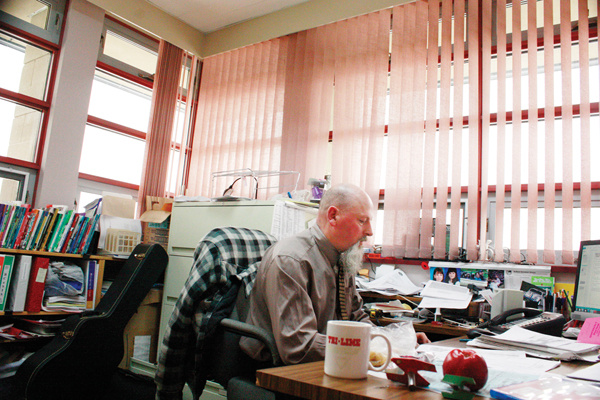
By: Frank Green
This year more than 30 percent of the graduating class at McBride Secondary School will only take the minimum number of classes they need to get a diploma. That’s part of a broader problem in British Columbia – students at very small schools tend to take fewer classes than those at larger ones, if not at a rate as high as at McBride Secondary.
And while the school is a tiny sample – just 16 kids will graduate this year – it’s also stark demonstration of the challenges rural schools face.
Most of the McBride Secondary’s funding is based off of how many classes its students enroll in, explained Principal Derrick Shaw. When one of the 86 students opts to take a “spare” and not take a class, the school has a little less money to pay teachers. And because McBride’s classes are so small, losing a couple of students – and the money that leaves with them – can force Shaw to cancel a class. That leaves even fewer classes that might interest students or fit into their schedules. And then students don’t sign up for as many classes as they could, completing the circle.
“There’s more kids than ever graduating with the bare minimum,” Shaw said. “We just don’t have the bodies to put in front of teachers anymore.”
The teenagers in question have varied reasons for not taking fewer classes. Occasionally they’re actually forced into a spare because they’ve already taken everything offered during a given period. (They can always take “distributed learning” classes online, but some don’t like them.)
Students sometimes use the extra hours from taking spares to start an apprenticeship or work a part-time job.
Sometimes they just hang out.
“I have more time to work, get stuff done at home,” said Molly Mortensen, 17, who works at the Beanery and has sheep, horses, chickens, and turkeys to tend to at home. She said she’d graduate with 88 credits – two more classes than the minimum. “I just wanted grade 12 to be a fun, easy year.”
For some, taking fewer classes can have expensive consequences, explained Jennifer L’Arrivee, a counselor as well as a physics and biology teacher at McBride Secondary. For example, if a student decides they want to go to university after they graduate, they may be stuck paying for classes they could have taken for free.
“It depends on what they’re going into,” L’Arrivee said. “Many of them have to upgrade because they don’t have the requirements,” she added, referring to high school classes some students take after graduation.
Shaw has resorted to crafty maneuvers to try to pump up enrollment, like scheduling grade 12 English in the second half of the year – if it was in the fall, students could finish their requirements then and be done with school. He hoped that if kids couldn’t skip town until the end of the school year, they might be inclined to take classes that fall to fill their days, even if they didn’t have to.
But there’s reason to believe kids would take more classes if the school offered ones they wanted to take. A new psychology class, for example, lured almost half of its class out of spares and into extra coursework.
“If courses are offered they may take them,” said Karen Dubé, chair of McBride Secondary’s Parent Advisory Council. “It’s just whether or not the province will continue to fund those programs with low enrollment – will they allow those courses at five or six kids?”



